|
|
|
Sort Order |
|
|
|
Items / Page
|
|
|
|
|
|
|
| Srl | Item |
| 1 |
ID:
074523


|
|
|
| 2 |
ID:
188943
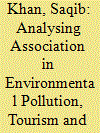

|
|
|
|
|
| Summary/Abstract |
Clean and green environment along with sustainable development is the prime objective of every state. We explore empirically the nexus between tourism, environmental pollution measured by carbon (CO2) emissions, population, trade, foreign direct investment (FDI) and economic growth in six countries from the Commonwealth of Independent States over 1995–2018. Traditional panel estimation technique is employed, where the Hausman test suggests fixed-effects over random effect estimator. We also employed the robust least squares (RLS) estimator to confirm the empirical estimates. Results show that a 1% increase in CO2 will attenuate the economic growth by 0.14% and that 1% raise in the tourism activities can boost growth by 0.04%. Both the fixed-effect and RLS estimates reveal that tourism, population growth and trade contribute significantly to economic growth, whereas CO2 adversely affect growth. The Granger causality test shows a two-way causality between economic growth and CO2 and between growth and trade. Empirical results also indicate a one-way causality between growth and FDI, population and FDI, population and CO2 along with population growth and tourism. These findings suggest that adopting effective policies that can expand trade, enhance FDI and promote the tourism sector with minimum environmental damage will ultimately accelerate sustainable economic development.
|
|
|
|
|
|
|
|
|
|
|
|
|
|
|
|
| 3 |
ID:
094665
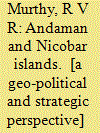

|
|
|
|
|
| Publication |
New Delhi, Northern Book Centre, 2007.
|
| Description |
xi, 202p.
|
| Standard Number |
9788172112196
|
|
|
|
|
|
|
|
|
|
|
|
Copies: C:1/I:0,R:0,Q:0
Circulation
| Accession# | Call# | Current Location | Status | Policy | Location |
| 054796 | 954.88/MUR 054796 | Main | On Shelf | General | |
|
|
|
|
| 4 |
ID:
160597
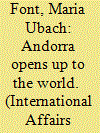

|
|
|
|
|
| Summary/Abstract |
International Affairs: Your Excellency, the Principality of Andorra is traditionally associated with tourism and trade. How is your state developing nowadays?
|
|
|
|
|
|
|
|
|
|
|
|
|
|
|
|
| 5 |
ID:
176484
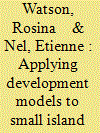

|
|
|
|
|
| Summary/Abstract |
Small island developing states (SIDS) face unique developmental challenges, not least their often narrow economic structure and dependence on a narrow range of economic activities. In this regard migration, remittances, dependence on aid, tourism and state employment feature prominently. This paper explores the nature of Niue's economy and the degree to which its economy depends on tourism and government services, both of which are supported through aid programmes. The limited dependence on remittances places Niue, as a SIDS, into the relatively narrow band of TOURAB states (those dependent on aid, tourism and bureaucracy). Understanding the nature of Niue's economy helps clarify the challenges the country faces, its development needs and the considerations which donors need to focus on through their support. It also clarifies how Niue should position itself relative to market opportunities and what the focus of development strategies should be.
|
|
|
|
|
|
|
|
|
|
|
|
|
|
|
|
| 6 |
ID:
122643
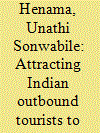

|
|
|
|
|
| Publication |
2013.
|
| Summary/Abstract |
South Africa in the post-1994 era has experienced phenomenal growth in foreign tourism. The Tourism White Paper (1996) had noted that South Africa missed its tourism opportunity because of the country's troubled past. The rapid economic growth experienced by the BRICS countries has changed the face of international tourism. The tourism destinations have moved from developed to developing countries. In this context, the article highlights that South Africa enjoys 2.6 per cent of the lucrative Indian outbound tourism market. This market share has the potential to be increased. India has been added to South African Tourism's (SAT's) Core Markets List. A longitudinal analysis from foreign arrivals indicates two things, one, that India remains the top Asian foreign arrivals country, represented by 71,587 arrivals in 2010, and two, that India remains resilient to hold to its number one spot in Asian foreign arrivals to South Africa. South Africa must gear itself up to encourage the trend.
|
|
|
|
|
|
|
|
|
|
|
|
|
|
|
|
| 7 |
ID:
145546
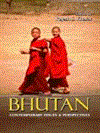

|
|
|
|
|
| Publication |
New Delhi, Adroit Publishers, 2016.
|
| Description |
xvii, 377p.: table, figurehbk
|
| Standard Number |
9788187393085
|
|
|
|
|
|
|
|
|
|
|
|
Copies: C:1/I:0,R:0,Q:0
Circulation
| Accession# | Call# | Current Location | Status | Policy | Location |
| 058694 | 954.5498/KHA 058694 | Main | On Shelf | General | |
|
|
|
|
| 8 |
ID:
152243
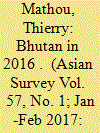

|
|
|
|
|
| Summary/Abstract |
Celebrated nationwide as a symbol of change in continuity, the birth of the future king gave confidence to Bhutan, which continued its path toward democracy and sustainable development without undermining its identity despite several challenges lying ahead.
|
|
|
|
|
|
|
|
|
|
|
|
|
|
|
|
| 9 |
ID:
160403
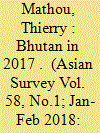

|
|
|
|
|
| Summary/Abstract |
Bhutan’s agenda in 2017 was dominated by the preparation for the third parliamentary elections (slated for 2018), the 12th Five-Year Development Plan (2018–23), and the golden jubilee of the establishment of diplomatic relations with India. A military standoff between China and India on Bhutan’s border highlighted the kingdom’s strategic regional position.
|
|
|
|
|
|
|
|
|
|
|
|
|
|
|
|
| 10 |
ID:
179262
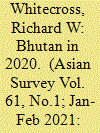

|
|
|
|
|
| Summary/Abstract |
The year 2020 in Bhutan was dominated by the coronavirus pandemic, a decline in state revenues, and territorial claims by China. In 2019, Bhutan’s strong economy suggested that the country would graduate from the least developed country category in 2023. The economic impact of the coronavirus pandemic on the economy makes this less certain.
|
|
|
|
|
|
|
|
|
|
|
|
|
|
|
|
| 11 |
ID:
111532
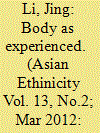

|
|
|
|
|
| Publication |
2012.
|
| Summary/Abstract |
This article looks at the filming of the Dai river bathing custom by the media professionals for tourism promotion in Xishuang Banna, China. It speaks to the previous scholarships that have studied the Otherness of ethnic minorities in China's mainstream and popular representations. Yet this case contextualizes this issue in the era of China's domestic tourism, when ethnic cultures and bodies are increasingly put on display, experienced, and (re-)produced through individualized, immediate, embodied encounters in tourist zones. By taking embodied experiences to the center, this article studies the touristic representation of ethnic minorities as China's national Others from an angle of embodiment. It inquires how the embodied experiences of both media professionals and Dai bathers at the filming constitute the very process during which Otherness, difference, and selfness are perceived, actualized, and (re-)produced in localized reality and at the grassroots level.
|
|
|
|
|
|
|
|
|
|
|
|
|
|
|
|
| 12 |
ID:
131230
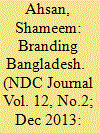

|
|
|
| 13 |
ID:
166929
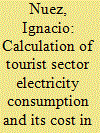

|
|
|
|
|
| Summary/Abstract |
The Canary Islands is a European archipelago whose principal economic activity is international tourism. Due to its geographic isolation, it does not have any connection with continental electricity grids. The Spanish state subsidises the extra cost of electrical energy generation in isolated systems. The purpose of this study is to quantify the proportion of the electricity bill that corresponds to tourist activity that is being subsidised. With this aim, three complementary methodologies have been developed. These tools could also be used in similar environments. The results reveal an average tourist sector consumption in the study years (2014–2017) between 12.8% and 16.5% of the total amount of electricity generated in the archipelago, with a monetary value of Spanish state subsidy estimated in €143.5 M in the year 2014. Additionally, a calculation was made of the values of CO2 emissions due to tourist electricity consumption for the years of the study period, with an estimated peak of 1.1 MtCO2 in 2017. From the point of view of energy policy, these results could be used to justify the adoption of various types of compensatory measures, including ecotaxes to be paid by the tourist visitor.
|
|
|
|
|
|
|
|
|
|
|
|
|
|
|
|
| 14 |
ID:
164073
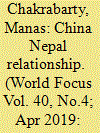

|
|
|
|
|
| Summary/Abstract |
In the domain of international arena, the aspect of relationship aspect is very significant. Relationship refers to the bonds of dependent or reciprocal relations. (Martin Pierre Marie-1986). So far as international politics is concerned, like all politics, it is a struggle for power. Whatever may be the ultimate aims of international politics, the power is always the immediate aim. (Morgenthau, Hans J., 1985). On the other hand, International Relations include the study of all human interactions across national borders and factors that affect those interactions.
|
|
|
|
|
|
|
|
|
|
|
|
|
|
|
|
| 15 |
ID:
106173
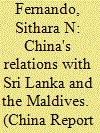

|
|
|
| 16 |
ID:
184030
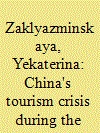

|
|
|
|
|
| Summary/Abstract |
In 2020 and 2021, the global tourism sector underwent profound transformations. Global lockdowns, border closures, and restrictions on the movement of citizens led to a recession in the tourism industry and to long-term negative consequences for the global economy. The pandemic highlighted the vulnerability of the sector, insufficient government support, excessive fragmentation, and the lack of experience in effectively dealing with new risks and threats.
|
|
|
|
|
|
|
|
|
|
|
|
|
|
|
|
| 17 |
ID:
122430
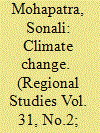

|
|
|
| 18 |
ID:
190795
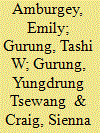

|
|
|
|
|
| Summary/Abstract |
How do high mountain communities, facing the grave effects from climate change and economic impacts of the COVID-19 pandemic on the local tourism industry, perceive and navigate multiple protracted disasters? This article takes up this question from the perspective of a specific mountain community, that of Mustang, a culturally Tibetan region of Nepal bordering the Tibet Autonomous Region (TAR), China. Our findings stem from collective ethnographic research conducted with Mustangi communities in Nepal and among the diaspora in New York City to investigate the nexus between high mountain livelihoods, particularly tourism, and the consequences of two distinct yet interlocking disasters: climate change and the global health crisis of the COVID-19 pandemic. We argue that the pandemic has undermined elements of Mustang’s economic future and simultaneously prompted a resurgent appreciation for and reliance on more traditional modes of community governance and social support. The fact that these dynamics are unfolding amidst ever-present concerns over the effects of climate change in the Himalayas, against the backdrop of labor- and education-driven outmigration, adds a profound layer of complexity to thinking about the future of tourism but also of Himalayan lives, from built infrastructures to the community resilience needed to sustain both.
|
|
|
|
|
|
|
|
|
|
|
|
|
|
|
|
| 19 |
ID:
064424
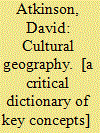

|
|
|
|
|
| Publication |
London, I. B. Tauris, 2005.
|
| Description |
xviii, 222p.
|
| Standard Number |
1860647030
|
|
|
|
|
|
|
|
|
|
|
|
Copies: C:1/I:0,R:0,Q:0
Circulation
| Accession# | Call# | Current Location | Status | Policy | Location |
| 049878 | 304.2/ATK 049878 | Main | On Shelf | General | |
|
|
|
|
| 20 |
ID:
160294


|
|
|
|
|
| Summary/Abstract |
This article seeks to measure the potential risk tolerance in tourism and to determine whether individuals’ rationality in daily life is consistent with their choice of destination for foreign travel. Findings of the research, carried out among Israeli students, indicate such a consistency: individuals with higher general risk aversion also have higher risk aversion in tourism. These results can give tourism service providers greater insight into how tourists make decisions, thus enabling them to offer destinations that are personally adapted to the travel experience and general risk tolerance of tourists.
|
|
|
|
|
|
|
|
|
|
|
|
|
|
|
|
|
|
|
|
|